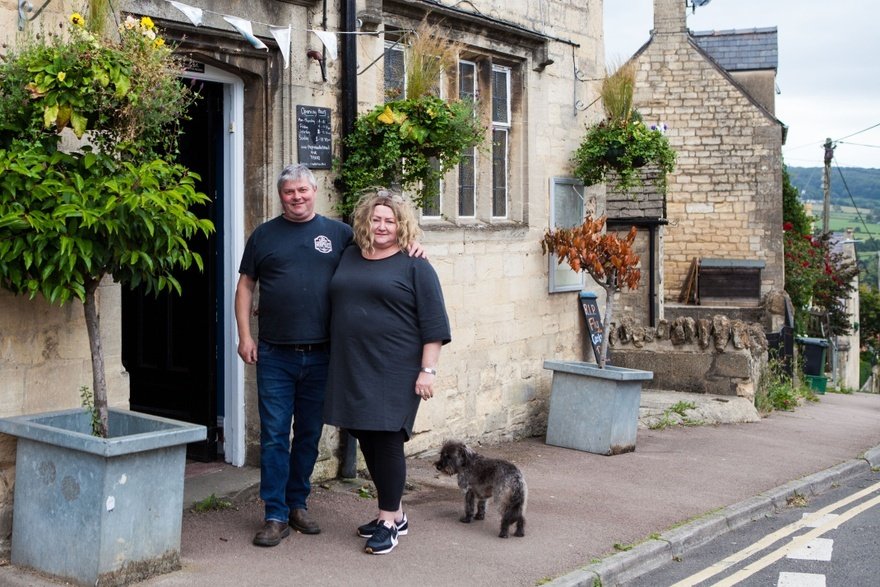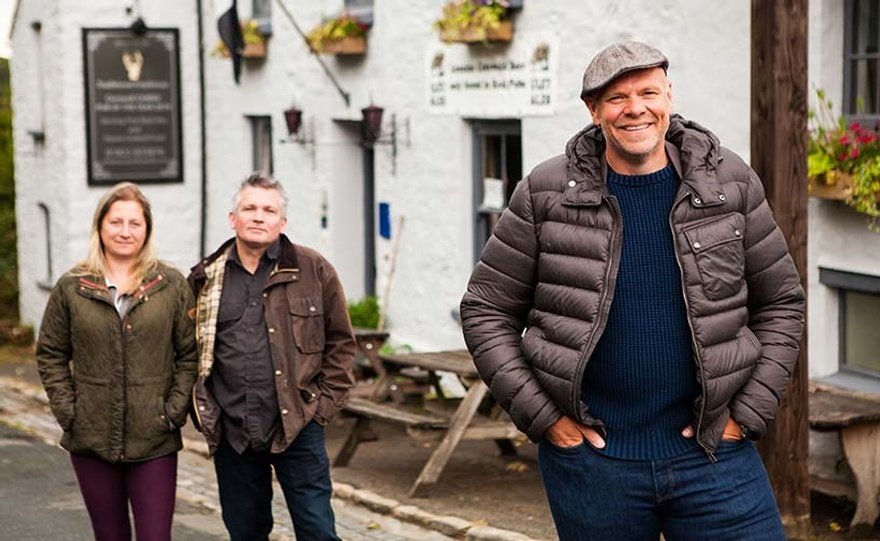Tom Kerridge on Saving Britain's Pubs: 'Our industry has never been under this much pressure'
Series one of BBC Two's Saving Britain's Pubs with Tom Kerridge came to its conclusion this evening, and presenter, chef-patron, restaurateur and publican Kerridge says he has been reminded of some important lessons along the way.
Kerridge and his wife Beth opened their first pub, the Hand & Flowers in 2005, and in the past 15 years have gone on to open five successful pubs and restaurants, employing more than 200 people. He has also become a well-respected voice in the hospitality industry and has found himself in more of a political role.
"I've always been quite opinionated and had a political viewpoint," said Kerridge. "And the more I find myself in this position, the more I'm asked about it. Now I'm talking about the pub industry, an industry that means so much to all of us, that's being squashed and squeezed. It's right that I talk about it from my perspective.
"I'm happy to express that viewpoint now. Our industry has never been under this much pressure – not politically, with regards to decision-making and how it affects us. It's hugely important and allows me to be political.
"Some of my closest friends have very difficult political views to me, but they also realise that what we are talking about now is leadership – that's what we are lacking. It's more than red and blue now, it's about honesty, trust, decision-making and engagement – these things have all disappeared.
"The way we've been communicated with has been shocking; the way we've found things out. We would never communicate like that as business owners. Imagine if I said to my staff that the only way they are going to find out if we're opening is if I tweeted!
"I find it astonishing the way it's been dealt with. That isn't political, it's a fact and just common sense."
Referring to pub companies, one area of the pub landscape addressed in the show, Kerridge was keen to point out that Clive Chesser, chief executive of Punch Pubs & Co, who had a conversation with Lottie Lister and Miles Connelly, landlords of a Punch-tied pub the Prince Albert in Stroud (below), was given a hard time.
Kerridge says that, despite comments on social media, "it was a very productive meeting. Although the tied-pub element of the show does not represent the whole of the industry, the point is we were able to get the CEO of a big pub company to appear on TV, and he knew he'd get a lot of flak.
"At the same time, we wanted to show how Miles and Lottie had to understand their business a lot better. Hopefully, the show highlighted that they are now approaching their business in a more constructive way, rather than being so free-spirited, which is what makes pub landlords like Lottie and Miles such exceptional pub people. Their generosity and their heart and soul is what makes pubs so popular."
Kerridge added that many pubs in the UK are now run by directors, shareholders and accountants, because that's become the nature of the business. His goal was to get two very different cultures to meet in the middle.
"That's where we need to be as an industry. To be able to represent ourselves in a less shouty, militant way. It's a starting point for conversations because the pubco model does need to change and it needs to be looked at, as do the rental systems and the mark-ups on beer, not just for landlords but for small-scale brewers, too.
"However, if big pub companies were the only problem with the pub industry, then every other pub in the country would be flourishing – and that's not true. There are so many different issues affecting the industry that it's a very complex situation."
If big pub companies were the only problem with the pub industry, then every other pub in the country would be flourishing – and that's not true
Asked about the role of trade associations, including the British Institute of Innkeeping (BII), UKHospitality and the British Beer & Pub Association (BBPA), Kerridge said that they all "have strong voices", that they have a better understanding of the corporate world and would play a huge role moving forward.
Three other pubs featured in the series: the White Hart in Chilsworthy in Cornwall, owned by Amy Newland and Ian Durnall (pictured below), the Golden Anchor in Nunhead, London, owned by Lana Bewry, and the Black Bull, a community-owned pub in Gartmoor, Scotland were also all featured in the last episode with various plans and decisions made.
"This series of Saving Britain's Pubs has definitely reinforced how important teamwork is to me," added Kerridge. "When I looked at other people's businesses, I saw the same kind of mistakes that we made along the way. Delegation is another huge lesson. Someone like Amy, who does everything, she went on that journey. But letting go of the reins also comes from not always being able to find the right staff. Staffing has always been a problem, although in the next year or so, it might not be.
"One thing I do know is that even with 15 years' experience, hospitality is full of risks; it's hugely at risk across the board. Unlike a lot of other businesses, there are no cash reserves, we're not rich. It's run by passionate people, and although a business might appear to be successful, behind the scenes there are so many factors to take into consideration that it's never secure. But in two years' time, the industry will still exist, because as human beings we love to hang out."
Photography: BBC/Bone Soup Productions
Continue reading
You need to create an account to read this article. It's free and only requires a few basic details.
Already subscribed? Log In







